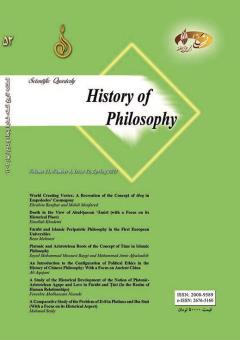Fārābī and Islamic Peripatetic Philosophy in the First European Universities
Subject Areas : . New findings about philosophical figures and schools of Iran and the world of Islam
1 - Associate Professor, Institute of Cultural, Social, and civilization Studies, Tehran, Iran
Keywords: European Universities, Peripatetic philosophy, Latin Averroes, Fārābī, Ibn Sīnā,
Abstract :
Fārābī, the renowned Iranian philosopher, is one of the central figures of Peripatetic philosophy in the world of Islam. The collection of his thoughts travelled beyond Islamic borders to Asian, Europe and Africa posthumously and influenced the scientific fields of Jewish, Christian, and other non-Islamic lands. The thoughts of Fārābī and two other prominent figures of this school of philosophy, Ibn Sīnā and Ibn Rushd, exercised an undeniable impact on the development of the higher scientific centers of Europe of the 13-15 centuries (AD). In fact, without considering their role in the formation of the first European universities, especially the university of Paris and the process of establishing the faculty of philosophy during the conflict between the two faculties of theology and art, one cannot attain a true knowledge of the reasons behind the development and expansion of the first European universities. Relying on valid historical documents and reports, this paper explains this influential process and, at the same time, portrays one of the routes of the transfer of Muslims’ culture and philosophical thoughts to Europe and the quality of the formation of the institution of university during that time.
